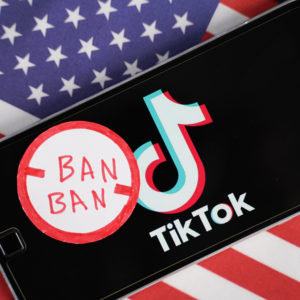There has been a dramatic rise in momentum over the past month for a congressional crackdown on TikTok, seen by many as an espionage tool used by the Chinese Communist Party to surveil Americans.
There are new reports almost weekly about how the Chinese-owned popular short-form video app is a honeypot of data insecurity with users’ sensitive personal information on a one-way path to Beijing.
After passing the House with overwhelming support from Republicans and Democrats, the TikTok Divestment proposal is now gaining steam in the Senate. Commerce Committee Chair Maria Cantwell, D-Wash., is poised to host a hearing and move the legislation. This comes as a rising chorus from senators on both sides of the aisle clamor for passage of this legislation.
This initiative is not just popular in the halls of Congress; it reflects the growing support of American voters. For example, a March 20 poll by Project 2100, conducted by Public Opinion Strategies, found a vast majority of voters support legislation that would force the effort to mitigate TikTok. One question in the poll found that 68 percent of Americans support legislation that would force ByteDance, which is controlled by the Chinese Communist Party, to sell its stake in TikTok.
But as American policymakers are rightfully raising concerns with the power and reach of the Chinese Communist Party, one American tech company is going the other way, publicly embracing the totalitarian regime. Tim Cook, the CEO of Apple, has collaborated with the CCP, disregarding concerns around privacy and security. Cook recently visited Beijing, praising the government while ignoring its many human rights violations.
The legislation before the Senate would not affect Apple because it is not a foreign adversarial-owned entity. However, Apple’s practices should raise eyebrows. For example, with the cascade of evidence about TikTok’s insecurity, why is Apple not claiming it is a security threat while blocking countless other apps for “security” reasons?
Apple could not only take steps to mitigate TikTok’s national security concerns but could also immediately take steps to tighten data flows from underage users of apps on its store.
Throughout the TikTok discussion, many on both sides have raised concerns that the app is being used by the CCP in ways that are harmful to children. This was most starkly evidenced by the many reports of children being prompted by notifications on the app to contact their representatives and senators to voice opposition to the TikTok bill. This led to many children threatening violence against legislators who voted the “wrong way.”
This led to some children threatening suicide. One such chilling call was shared by Sen. Thom Tillis (R-N.C.) demonstrating how TikTok can provoke this type of hysteria.
As the political discourse continues around TikTok, it should prompt further questions about entities further entrenching themselves with the CCP. Especially when the app store is marketed as essential for data security in the app ecosystem.
The TikTok legislation is not only a critical step to protect Americans from foreign espionage but also is an essential look into the more extensive conversations around technology and security.


